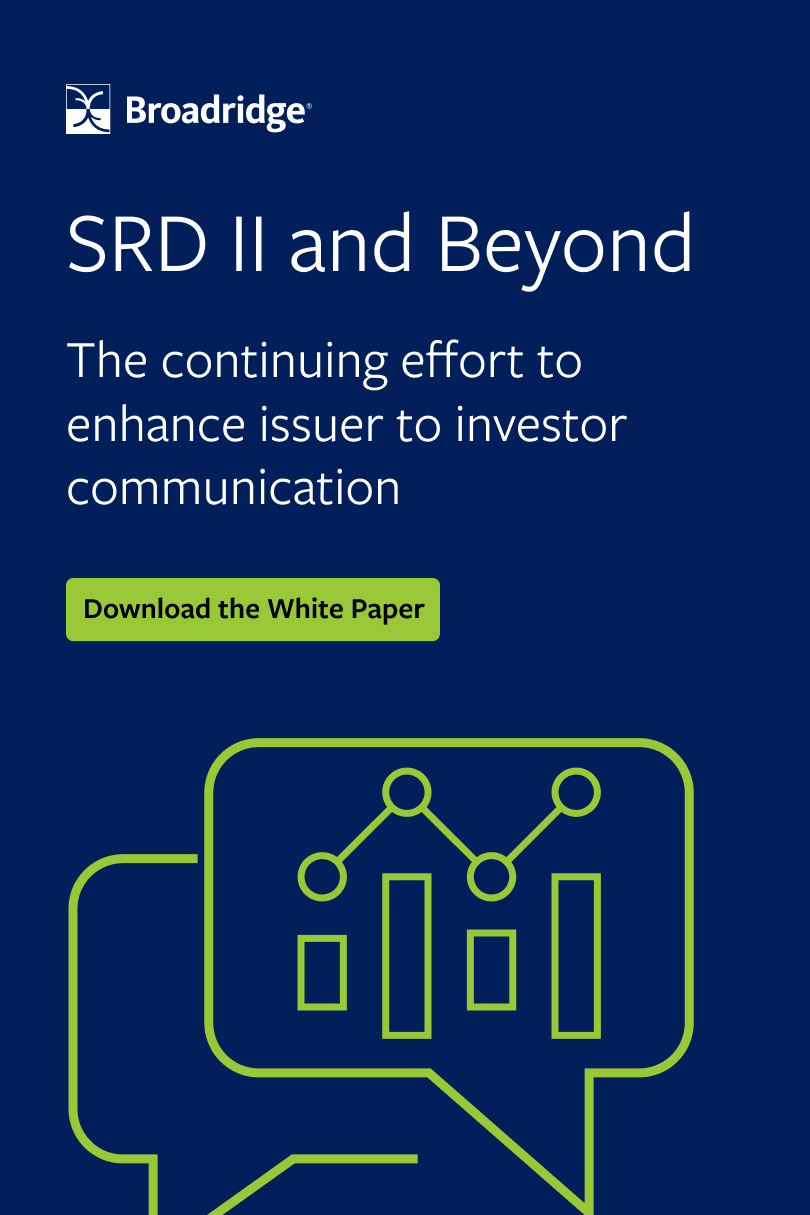The COVID-19 pandemic has caused many events to be put on hold. This is no different in the financial services industry with important implementation dates for regulations being pushed back to allow firms more time in light of the current situation.
There have been delays to regulations such as the Securities Financing Transactions Regulation (SFTR), which was set to be implemented in April, and the final phases of the Uncleared Margin Rules. There have also been proposed delays to the second Shareholders Rights Directive (SRD II).
Asset managers, pension funds and insurance companies are scheduled to come in-scope of UMR based on their volume thresholds on the new deadlines of 1 September 2021 for phase 5 or 1 September 2022 for phase 6.
Although deadline extensions could cause a slowdown in production, financial institutions are using this extra time wisely, according to industry experts, as opposed to taking a back seat.
Patric Foley-Brickley, managing director of Maitland Instutional Services, a global advisory and fund administration firm, affirms that the fund industry is definitely not using COVID-19 as an excuse to de-emphasise the focus on regulation.
“We constantly scan the regulatory horizon to make sure that we are going to be ready for any upcoming changes to the regulatory environment, irrespective of the demands of the current situation,” Foley-Brickley says.
While the regulators have delayed the implementation date of some of the impending changes, Foley-Brickley highlights that there are the new rules relating to liquidity stress testing which are due to be implemented in September, for which no delay has been announced.
“As a result, we continue to evolve and implement enhanced solutions to ensure that we can meet the demands of new and existing regulation,” he says.
Meanwhile, Joseph Spiro, director of product management at Hazeltree, observes that the regulatory delays have allowed buy-side firms to focus on immediately critical issues such as managing market turbulence (which has resulted in spiking margin call volumes), along with the logistical obstacles involved with managing remote teams during the pandemic.
Spiro says: “For these reasons, the buy-side firms we have spoken to have reacted to the regulatory delay with a sigh of relief. That being said, preparations continue, particularly for firms subject to phase 5 of UMR.”
Using the time wisely
The extended deadlines to regulations have allowed firms more time to decide on the right partners and more time to implement the technology needed to comply. The complexity of regulations such as SFTR requires enhanced technology to deal with the abundance of data associated with it.
Spiro says: “The process of deciding on and implementing the best technology to create an efficient and compliant process, as well as determining the preferred custody arrangements, and signing all the necessary documentation, is a long road. Since the publication of our UMR guide ‘Clearing up the uncleared margin rules’, we’ve been receiving requests for information on all of these topics.”
Additionally, Spiro cautions that the preparations are not something that can be done overnight. “Prior to the delay, many phase 5 firms found themselves scrambling to try to put something in place before the deadline. The delay provided a needed reprieve, but hopefully, those firms won’t repeat the pattern and find themselves scrambling again this time next year,” he says.
Meanwhile, Foley-Brickley affirms that adherence to regulation must be maintained irrespective of the conditions that you find yourself in.
“A concept highlighted in the Asset Management Market Study and a key focus of the Financial Conduct Authority (FCA) during 2020 is that of ‘operational resilience’. Operational resilience takes contingency planning and business continuity to a higher level to the extent that regulated entities must be able to demonstrate that they are able to operate on a business as usual (BAU) basis no matter what situation or environment they find themselves in,” Foley-Brickley comments.
He continues: “COVID -19 has been a real-life test of an organisation’s ability to demonstrate Operational Resilience to a contingency event that almost nobody saw coming. The industry’s reaction to COVID-19 and the speed with which it was able to accommodate the radical changes to the working environment and still provide a high-quality service has demonstrated the flexibility and operational resilience of the industry across the board.”
“Notwithstanding, any delays to the statutory implementation dates for new regulation will clearly help organisations. However, the hard work and planning that will have been done in anticipation will not be wasted as the new regulations come into effect, albeit at a later date,” he adds.
As firms ready themselves for go-live dates, one of the challenges that has been identified includes transparency about the status of margin calls disputes.
Spiro says: “With margin call volumes spiking and disputes averaging about 30 percent of all calls historically, credit officers at buy-side firms will want real-time information about these margin call volumes, collateral payments, size of disputes, etc. It’s important that collateral practitioners offer timely and accurate management and risk reporting to keep all parties in their organisation well informed.”
Additionally, Spiro highlights the importance of providing access to a real-time reporting portal, which can provide this transparency efficiently, without using operational resources to produce manual reports.
Among other challenges in the regulatory space, Foley-Brickley highlights that it’s about making sure you are keeping up to date with the required changes and will be on-time with the delivery of a working and robust solution. “Sitting on your hands and waiting until after the pandemic is over is not currently an option being offered by the regulators,” he warns.
“Equally, it is important to recognise that the challenges of COVID-19 have affected regulators in the same way as the rest of the industry. Delays to regulation are driven as much by the regulators’ ability to implement the necessary changes at their end and to ensure that they have the resource and systems so that new regulation can be properly overseen,” Foley-Brickley says.
Elsewhere, Foley-Brickley stipulates that in the COVID-19 contingency environment one of the most difficult challenges has been keeping momentum in on-going BAU projects and if anything has been pushed back it is non-business critical project work.
A juggling act
Discussing which regulations will be particularly challenging, Spiro believes that the move away from LIBOR is probably the most difficult because it has become so ingrained in everyone’s processes.
“But UMR takes the prize for longest to implement, due to all the moving parts. Things like third party and/or triparty custody, calculating SIMM, collecting IM along with posting both IM and IA, are topics that many on the buy-side have never had to think about before. And between service providers, technology providers, lawyers and custodians, there are many factors to juggle at once,” Spiro observes.
Meanwhile, Foley-Brickley notes that often the larger the financial institution, the larger the challenge becomes in implementing regulatory change.
“By example, for an organisation such as ourselves the implementation and operation of SM&CR required understanding, thought and planning - but as the number of people who came into scope was relatively small the challenge was very manageable. Conversely, larger organisations like banks and broker dealers had hundreds and even thousands of people who were required to take Senior Manager and Certificated roles. The sheer scale of the challenge required vast and dedicated project teams and considerable input from senior executives across multiple businesses and departments to ensure that SM&CR could be properly implemented and managed going forwards.”
Further to this, Foley-Brickley observes that a key challenge for financial institutions is understanding how regulations aimed at one sector of the market will affect the compliance obligations of another.
“By example, non-Markets in Financial Instrument Directive (MiFID) firms such as ourselves are not directly impacted by the MiFID legislation. However, because the investment managers that we appoint and oversee are MiFID firms and the regulations that govern much of the investment process are MiFID driven, it is essential that we know and understand the MiFID regulations to ensure adherence as compliance,” Foley-Brickley adds.
Post-pandemic effects
Many effects from the pandemic are similar to those felt by the economy after the financial crisis of 2007/2008. However, unlike the crisis, the disruption has not been sparked by the finance sector, but it will still force firms to reassess their plans for operational resilience.
Foley-Brickley highlights: “There are only three certainties in life: death, taxes, and more stringent regulations over time! We absolutely will see an increase, and in my experience, regulations have never ever become less stringent.”
Looking ahead, Foley-Brickley notes that once Brexit is completed and the UK is fully out of Europe it will be interesting to see how the approach of the regulator evolves.
He adds: “The FCA has stated in its business plan that regulation will continue to become increasingly outcome-focused and driven by ensuring the right outcome for the investor. Which is a concept that is difficult to argue with.”
Meanwhile, Spiro predicts that any new regulations would impact the sell-side rather than the buy-side.
Spiro concludes: “I imagine the banks will have to demonstrate on a regular basis that they can operate remotely and be fully functional. The requirements for bank stress tests have already begun to change in that manner.”



